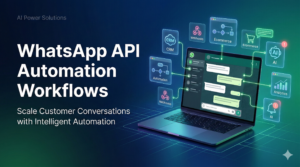In today’s fast-paced business world, staying ahead of the competition is no longer just an option, it’s a necessity. And one tool that has the potential to transform the way businesses operate and succeed is Artificial Intelligence (AI). The future is now, and AI tools are here to unlock your business’s full potential. AI tools offer a wide range of applications that can help businesses streamline processes, improve efficiency, and make better-informed decisions. From machine learning algorithms that analyze massive amounts of data to natural language processing technologies that enhance customer interactions, AI has the power to revolutionize the way we do business. But how can you harness the power of AI for your own business success? In this article, we will explore the various ways in which AI tools can be used to drive growth, boost productivity, and enhance customer experiences. Whether you’re a small startup or an established enterprise, understanding and implementing AI tools will give you the competitive edge you need to thrive in today’s digital landscape. So let’s dive in and discover how AI can take your business to new heights.
Understanding the power of AI in business
Integrating AI tools into business operations offers a multitude of benefits that can significantly enhance productivity and efficiency. Firstly, one of the most notable advantages is the ability to automate repetitive tasks. Many businesses struggle with mundane, time-consuming activities that can drain employee morale and productivity. AI tools can take over these tasks, allowing human employees to focus on more strategic and creative aspects of their work. By relieving staff of repetitive responsibilities, organizations can foster a more engaged workforce that contributes to higher levels of innovation and overall job satisfaction.
Secondly, AI tools can lead to improved decision-making processes. With access to advanced data analytics and predictive modeling, businesses can make more informed decisions based on real-time data rather than relying on intuition or outdated information. AI-driven insights can uncover hidden opportunities and risks, providing organizations with a clearer view of their market landscape. This capability enables businesses to identify trends early, adapt their strategies accordingly, and ultimately make decisions that align with their long-term goals.
Additionally, AI can enhance customer experiences by personalizing interactions and improving service delivery. With the ability to analyze customer data, AI tools can help businesses tailor their offerings to meet individual preferences and needs. This level of personalization not only increases customer satisfaction but also fosters loyalty, leading to repeat business and positive word-of-mouth. In today’s competitive environment, where customers expect personalized experiences, leveraging AI tools can provide businesses with a distinct advantage in attracting and retaining clients.
Understanding the power of AI in business
Artificial Intelligence (AI) has emerged as a game-changer in the business landscape, fundamentally altering how organizations operate and make decisions. At its core, AI encompasses a range of technologies that enable machines to mimic human cognitive functions, such as learning, reasoning, problem-solving, and even understanding language. This capability allows businesses to harness vast amounts of data, turning it into actionable insights that can drive strategic decisions and enhance operational efficiency. By integrating AI into their operations, companies can gain a competitive edge, streamline processes, and ultimately increase profitability.
The power of AI lies in its ability to analyze data at unprecedented speeds and scales. Traditional methods of data analysis can be time-consuming and prone to human error, but AI algorithms can process vast datasets in real-time, identifying patterns and trends that would be impossible for humans to discern. This capability is particularly valuable in industries such as finance, healthcare, and retail, where data-driven decisions can significantly impact outcomes. Moreover, AI can continuously learn and adapt, allowing businesses to refine their strategies as new information becomes available, ensuring that they remain agile in a rapidly changing market.
Furthermore, AI is not just reserved for large enterprises; small and medium-sized businesses (SMBs) can also leverage these technologies to enhance their operations. With the advent of cloud-based AI solutions, SMBs can access powerful tools that were once only available to larger organizations. By democratizing access to AI, these tools empower businesses of all sizes to innovate, compete, and thrive. As the business landscape continues to evolve, understanding the power of AI will be essential for any organization seeking to achieve sustainable growth and maintain a competitive edge in their respective industries.
AI tools for marketing and advertising
In the realm of marketing and advertising, AI tools are transforming how businesses connect with their audiences. One of the key benefits of using AI in marketing is the ability to analyze consumer data at scale. By leveraging machine learning algorithms, businesses can gain insights into customer behavior, preferences, and trends, allowing them to create targeted marketing campaigns that resonate with their audience. This data-driven approach ensures that marketing efforts are not only efficient but also effective, as businesses can allocate resources to channels and strategies that yield the highest return on investment.
Furthermore, AI can enhance customer segmentation, enabling marketers to identify and target specific groups with tailored messaging. Traditional segmentation methods may rely on broad demographics, but AI can analyze a multitude of variables, such as purchasing history, online behavior, and engagement patterns, to create highly refined customer segments. This precision allows businesses to craft personalized marketing messages that speak directly to the needs and preferences of each group, resulting in higher engagement rates and conversion rates.
Additionally, AI tools can optimize advertising spend through programmatic advertising. By using algorithms to automate the buying and placement of ads in real-time, businesses can ensure that their advertisements reach the right audience at the right time. This not only maximizes exposure but also minimizes wasted ad spend, as AI can adjust strategies based on performance data. The ability to continuously optimize campaigns in real-time enables businesses to stay agile and responsive to market changes, ensuring that their marketing efforts remain relevant and impactful.
AI tools for workflow automation and efficiency
Workflow automation is a critical area where AI tools can significantly improve business processes. By automating routine tasks, organizations can streamline operations, reduce errors, and increase productivity. For instance, AI can be employed to automate data entry, invoice processing, and even employee onboarding. These tasks, when performed manually, can be time-consuming and prone to human error. However, with AI-driven automation, businesses can ensure accuracy and efficiency, freeing up employees to focus on more strategic initiatives that drive growth.
Moreover, AI tools can enhance collaboration and communication within teams. By integrating AI into project management platforms, businesses can automate task assignments, track progress, and provide real-time updates. This capability not only improves accountability but also fosters a culture of transparency and collaboration. Team members can focus on their core responsibilities, knowing that AI is handling the logistical aspects of their projects, leading to more productive and cohesive teams.
Additionally, AI can analyze workflows to identify bottlenecks and inefficiencies. By monitoring processes and performance metrics, AI tools can provide insights into areas that require optimization. This data-driven approach enables organizations to refine their workflows, eliminating unnecessary steps and ensuring that resources are allocated effectively. As a result, businesses can operate more efficiently, reducing costs and enhancing overall performance.
Implementing AI tools in your business
Successfully implementing AI tools in a business requires a strategic approach that considers various factors, including the organization’s goals, resources, and culture. The first step in this process is to identify specific areas where AI can add value. This could involve automating repetitive tasks, enhancing customer interactions, or improving data analysis capabilities. By clearly defining the objectives for AI implementation, businesses can ensure that the selected tools align with their overall strategy and contribute to achieving their goals.
Once the objectives are established, businesses must assess their existing infrastructure and data readiness. AI tools often require access to large volumes of data to function effectively, so organizations must ensure that their data is clean, organized, and accessible. This may involve investing in data management solutions or conducting a thorough audit of existing data sources. Additionally, businesses should consider the technical requirements of the AI tools they intend to implement, ensuring that their infrastructure can support the new technologies.
Training and change management are also critical components of successful AI implementation. Employees must be equipped with the knowledge and skills to effectively use AI tools in their roles. This may involve providing training sessions, workshops, or online resources to help staff understand how to leverage AI in their daily tasks. Furthermore, fostering a culture that embraces innovation and change is essential for overcoming resistance and ensuring that AI tools are adopted effectively. By engaging employees in the process and highlighting the benefits of AI, businesses can create a more receptive environment for technological advancement.
Conclusion: Embracing the future with AI tools
As we navigate the complexities of the modern business landscape, the integration of AI tools has become imperative for organizations seeking to thrive. By harnessing the power of AI, businesses can unlock unparalleled efficiencies, enhance customer experiences, and make more informed decisions. The future is now, and those who embrace AI will position themselves at the forefront of their industries, ready to adapt to changing market dynamics and consumer expectations.
Embracing AI tools is not merely about keeping pace with competitors; it is about leveraging technology to foster innovation and drive growth. Whether through automating repetitive tasks, optimizing marketing strategies, or enhancing customer service, AI presents a wealth of opportunities for businesses of all sizes. By understanding the potential of these tools and taking a strategic approach to implementation, organizations can unlock new levels of performance and success.
Ultimately, the journey towards AI adoption is one of continuous learning and adaptation. As technology evolves, so too must our approaches to leveraging it. By fostering a culture that embraces change and innovation, businesses can ensure they remain agile and competitive in an increasingly digital world. The future is now, and with AI tools at their disposal, organizations can confidently navigate the challenges and opportunities that lie ahead.






